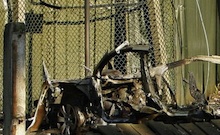
At one minute past midnight on Monday, policing and justice powers became the responsibility of a Six County Assembly for the first time in almost forty years. Just twenty minutes later, a huge blast echoed across Belfast and into neighbouring counties from across Belfast Lough.
Later in the day, as politicians broadly condemned the ‘Real IRA’ attack on the headquarters of MI5 at Holywood, County Down, the Six-County minister of Justice was named as the mild-mannered leader of the Alliance Party, David Ford.
The events pitted the political establishment, including Sinn Fein, against the republican hardliners who have vowed to remove all British Crown forces from Ireland.
The ‘Real IRA’ claimed responsibility for the blast at Palace Barracks, which was heard across Belfast Lough as far north as Carrickfergus. It was directly targeted at the new MI5 building, to become the centre of British military policing operations in the north of Ireland.
The driver of the vehicle, which the PSNI police said was a taxi, issued a warning before fleeing.
“The taxi driver got out [of the car] and shouted ‘It’s a bomb, it’s a bomb!’ and we were evacuating the area when it exploded,” a PSNI spokeswoman said. One man received shrapnel injuries in the explosion, she said.
There were also reports that the driver had been ordered by the ‘Real IRA’ to leave the car containing the device at the base.
The attack was clearly timed to coincide with the devolution of policing and justice powers from Westminster to Stormont. The PSNI Chief Matt Baggott said again today that the threat from the republican armed groups is “severe”.
British Direct Ruler Shaun Woodward condemned the attack and said: “Today Northern Ireland will complete devolution with the transfer of policing and justice powers to Stormont.
“That democratic transition stands in stark contrast to the activity of a criminal few who will not accept the will of the majority of people of Northern Ireland.
“They have no support anywhere.”
The newly appointed justice minister said a successful transfer of powers would reduce the support for the ‘dissident’ republican groups.
“I think there is no doubt they will try to make similar statements in various parts of Northern Ireland in the future,” Mr Ford told RTE radio.
“I have no doubt though that we will probably see a reduction in support of such activity if we see a successful transition of policing and justice powers later today.”
DUP leader Peter Robinson also condemned the attack, while Sinn Fein’s Martin McGuinness insisted the peace process remained “rock solid”.
Mr McGuinness said Sinn Fein would not be deflected from the peace process, which, he added, had the overwhelming support of people in Ireland.
Taoiseach Brian Cowen, speaking in County Tipperary, described the bombing as as “very futile act” and said the institutions set up in the Six Counties had the support of the people of the island of Ireland.
“They [dissidents] don’t have a mandate of any description. It’s a criminal act. We will use all the resources available on the island of Ireland to confront these people who are trying to undermine the hard work of so many people.”
The explosion follows another large a car bomb which damaged a court building in Newry, County Down, in February.
‘NOTHING HAS CHANGED’
The President of Republican Sinn Fein, Des Dalton said the devolution of “areas of British policing and justice” to Stormont changed nothing.
“The Stormont Executive will administer the limited devolved responsibilities for British policing and justice as a proxy for the British government,” he said.
“It does not change the nature of British rule on the ground as events in Lurgan, Craigavon and Armagh in recent weeks show only too well.
“Political policing will be directed as before, from London as set out in both the St Andrews Agreement and the Hillsborough Agreement. With an increased budget and new HQ in Palace Barracks in Holywood, County Down, MI5 will lead the British war machine in Ireland.
“The only basis for a just and lasting settlement is a British withdrawal allowing for the exercise of true All-Ireland democracy. “
But Sinn Fein President Gerry Adams described the historic transition as “the day we were told would never happen”.
“There was great opposition from the unionist parties. And the SDLP threw in the towel on Policing legislation almost 10 years ago in 2001,” he said.
“They said at that time that it would be impossible to get any other legislation. Sinn Fein stuck at it.
“We have delivered an increased policing and justice budget and a whole raft of new legislation. We have secured the transfer of policing and justice powers; and won the support of most of the other parties.
“So this is yet another important step forward in the ongoing process of change. The peace process is being challenged but the peace process is working.
“Sinn Fein is very pleased with today’s progress and we are determined to keep moving forward.”
![[Irish Republican News]](https://republican-news.org/graphics/title_gifs/rn.gif)
![[Irish Republican News]](https://republican-news.org/graphics/title_gifs/harp.gif)

